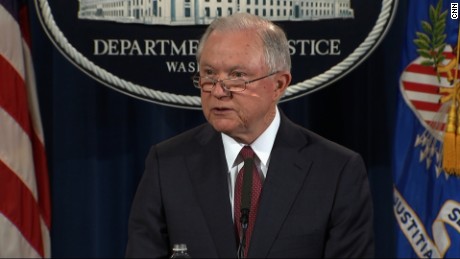After months of unease, the Trump administration officially announced its decision to “terminate” the DACA program, which protected nearly 800,000 undocumented youth who arrived to the U.S. when they were minors.
Attorney General Jeff Sessions made the announcement at a Tuesday morning press briefing. Sessions said the administration will give a six-month window for Congress to pass legislation, saying the program would be phased out in an “orderly wind down.”
In a memo, the Department of Homeland Security affirmed that no current beneficiaries will be impacted before March 5, 2018. However, DHS “will reject all DACA initial requests and associated applications for Employment Authorization Documents” filed after today.
All DACA permits renewed between now and March will be valid for their normal two-year period. But those applications must be filed by October 5.
The administration’s announcement came in anticipation of a legal fight by a group of Republicans who say the Obama-era program is unconstitutional. In a letter, ten attorneys general and the governor of Idaho promised in June to sue the federal government if it did not eliminate DACA by September 5.
In his remarks, Sessions said DACA had been “implemented unilaterally to great controversy and legal concern” after Congress tried unsuccessfully to pass legislation to protect Dreamers a number of times.
“Congress rejected legislative proposals to extend similar benefits on numerous occasions to this same group of illegal aliens,” Sessions said. “In other words the executive branch, through DACA, deliberately sought to achieve what the legislative branch specifically refused to authorize on multiple occasions.”
He said that was “an unconstitutional exercise of authority by the executive branch.”
Trump’s decision contradicts a number of statements he made in recent months. In a January interview on ABC, Trump said that DACA beneficiaries: “shouldn’t be very worried … I have a big heart.” On Friday, Trump told reporters “We love the Dreamers.”
Amid fears that the administration would do away with DACA, a number of Republican and Democratic lawmakers introduced legislation in recent months to protect young Dreamers. One bill, called the “Bridge Act,” would grant the same benefits as DACA to the same categories of beneficiaries.
The other three options, including the bipartisan “Dream Act,” would go one step further, giving dreamers a way to legalize their status and eventually become U.S. citizens.
The question now is whether any of these legislative options could actually move to a vote in 2017.
Source: UNIVISION

